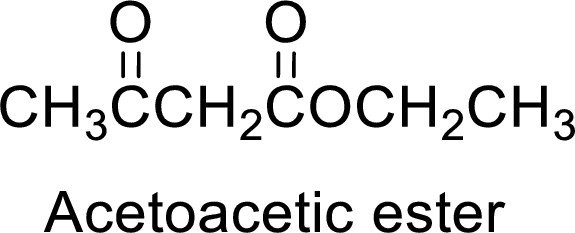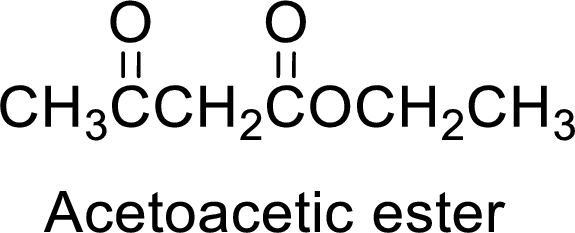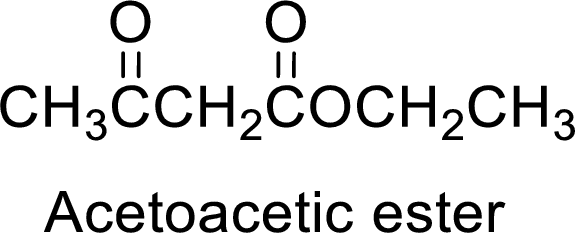
(a)
Interpretation:
The synthesis of acetoacetic ester can be used to prepare 5-phenyl-2,5-pentanedione has to be showed.
Concept Introduction:
Acetoacetic ester is a versatile starting material for the formation of new carbon-carbon bonds. It is because of the presence of acidic α-hydrogens between two carbonyl groups, the nucleophilicity of the enolate anion formed by the loss of α-hydrogen and the ability of the product to undergo decarboxylation after hydrolysis of ester.

(b)
Interpretation:
The synthesis of acetoacetic ester can be used to prepare 1-cyclopentyl-1-ethanone has to be showed.
Concept Introduction:
Acetoacetic ester is a versatile starting material for the formation of new carbon-carbon bonds. It is because of the presence of acidic α-hydrogens between two carbonyl groups, the nucleophilicity of the enolate anion formed by the loss of α-hydrogen and the ability of the product to undergo decarboxylation after hydrolysis of ester.

(c)
Interpretation:
The synthesis of acetoacetic ester can be used to prepare 3-ethyl-2-pentanone has to be showed.
Concept Introduction:
Acetoacetic ester is a versatile starting material for the formation of new carbon-carbon bonds. It is because of the presence of acidic α-hydrogens between two carbonyl groups, the nucleophilicity of the enolate anion formed by the loss of α-hydrogen and the ability of the product to undergo decarboxylation after hydrolysis of ester.

Trending nowThis is a popular solution!

Chapter 19 Solutions
OWLv2 with MindTap Reader, 1 term (6 months) Printed Access Card for Brown/Iverson/Anslyn/Foote's Organic Chemistry, 8th Edition
- What is the name of the following compound? SiMe3arrow_forwardK Draw the starting structure that would lead to the major product shown under the provided conditions. Drawing 1. NaNH2 2. PhCH2Br 4 57°F Sunny Q Searcharrow_forward7 Draw the starting alkyl bromide that would produce this alkyne under these conditions. F Drawing 1. NaNH2, A 2. H3O+ £ 4 Temps to rise Tomorrow Q Search H2arrow_forward
 Introduction to General, Organic and BiochemistryChemistryISBN:9781285869759Author:Frederick A. Bettelheim, William H. Brown, Mary K. Campbell, Shawn O. Farrell, Omar TorresPublisher:Cengage Learning
Introduction to General, Organic and BiochemistryChemistryISBN:9781285869759Author:Frederick A. Bettelheim, William H. Brown, Mary K. Campbell, Shawn O. Farrell, Omar TorresPublisher:Cengage Learning Organic ChemistryChemistryISBN:9781305580350Author:William H. Brown, Brent L. Iverson, Eric Anslyn, Christopher S. FootePublisher:Cengage Learning
Organic ChemistryChemistryISBN:9781305580350Author:William H. Brown, Brent L. Iverson, Eric Anslyn, Christopher S. FootePublisher:Cengage Learning Chemistry for Today: General, Organic, and Bioche...ChemistryISBN:9781305960060Author:Spencer L. Seager, Michael R. Slabaugh, Maren S. HansenPublisher:Cengage Learning
Chemistry for Today: General, Organic, and Bioche...ChemistryISBN:9781305960060Author:Spencer L. Seager, Michael R. Slabaugh, Maren S. HansenPublisher:Cengage Learning General, Organic, and Biological ChemistryChemistryISBN:9781285853918Author:H. Stephen StokerPublisher:Cengage Learning
General, Organic, and Biological ChemistryChemistryISBN:9781285853918Author:H. Stephen StokerPublisher:Cengage Learning Organic And Biological ChemistryChemistryISBN:9781305081079Author:STOKER, H. Stephen (howard Stephen)Publisher:Cengage Learning,
Organic And Biological ChemistryChemistryISBN:9781305081079Author:STOKER, H. Stephen (howard Stephen)Publisher:Cengage Learning,




